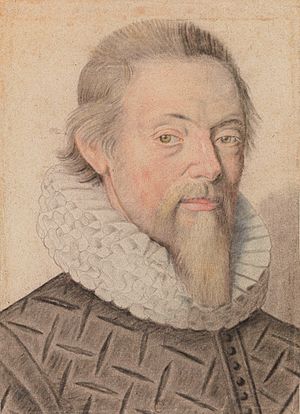Philippe de Mornay facts for kids
Philippe de Mornay (born November 5, 1549 – died November 11, 1623) was an important French writer and political thinker. He was a Protestant, which means he followed a branch of Christianity different from the main Catholic church at the time. He was also part of a group called the Monarchomaques, who believed that kings should not have absolute power.
Contents
A Young Life and New Faith
Philippe de Mornay was born in a place called Buhy, in France. His mother was interested in the Protestant faith. His father sent him to a Catholic school in Paris to try and keep him from becoming Protestant. However, after his father died in 1559, his family officially became Protestant.
Mornay studied law in 1565 at the University of Heidelberg. The next year, he studied Hebrew and German at the University of Padua.
Joining the Fight
In 1567, during the French Wars of Religion, Mornay joined the army of Prince Louis I de Bourbon, prince de Condé. But he had an accident, falling from his horse, which stopped him from fighting.
In 1571, he started his career as a writer defending the Huguenot faith. Huguenots were French Protestants. In 1572, he became a diplomat. This meant he worked for his country, carrying out secret missions for Admiral de Coligny to William the Silent, who was a prince in the Netherlands.
Escaping Danger
Mornay managed to escape the terrible St. Bartholomew's Day Massacre in 1572. This was a time when many Protestants were killed in France. A Catholic friend helped him hide, and he found safety in England.
He returned to France in late 1573. For the next two years, he fought in battles alongside the future Henry IV of France. Henry was then the King of Navarre. Mornay was captured by the Duke of Guise in 1575. But he was quickly set free after a small payment was made by Charlotte Arbaleste. He married Charlotte soon after in Sedan.
A Trusted Advisor
Mornay slowly became known as Henry IV's most trusted helper. He represented Henry in England from 1577 to 1578 and again in 1580. He also worked for Henry in the Netherlands from 1581 to 1582.
In 1584, Henry IV became closer to becoming the King of France. This was when Mornay became very active in politics. After another important leader, Henry I, Prince of Condé, died in 1588, Mornay's influence grew even more. People even called him the "Huguenot pope" because he was so important to the Protestants.
He was present at the siege of Dieppe and fought in the Battle of Ivry. He was also at the siege of Rouen in 1591-1592. Later, he was sent on a mission to meet Queen Elizabeth in England. Both he and his wife became friends with important English Protestants like Francis Walsingham and Philip Sydney.
Later Life and Legacy
Mornay was very sad when Henry IV decided to become Catholic in 1593. He slowly left the royal court. He then focused his efforts on the Academy of Saumur. This was a famous Protestant school that he helped to lead. The school was later closed by King Louis XIV in 1683.
His later years were filled with sadness. He lost his only son in 1605 and his beloved wife in 1606. Despite this, he continued to work on improving the organization of the Huguenots. In 1618, he was chosen to represent French Protestants at the Synod of Dort. This was an important meeting of Protestant leaders. King Louis XIII did not allow him to attend in person. However, Mornay still helped by sending written messages.
In 1621, he lost his position as governor of Saumur when the city was captured by French royal forces during a Huguenot uprising. He died in retirement on his estate in La Forêt-sur-Sèvre in 1623.
His Writings
In 1598, Mornay published a major work he had been working on for a long time. It was called De L'institution, usage et doctrine du saint sacrement de l'eucharistie en l'église ancienne. This book contained thousands of quotes from religious texts and scholars.
A Catholic bishop named Jacques Davy Du Perron accused Mornay of misquoting some parts of his book. A public debate was held in Fontainebleau in 1600 to discuss this. The debate was stopped because Mornay became ill.
Mornay also played a key role in writing the Edict of Nantes in 1598. This important law gave Protestants some political rights and religious freedom in France.
Some of his other important books include:
- Excellent discours de la vie et de la mort (1577): A gift for his wife, Charlotte.
- Traité de l'Église (1578): A book about the Church.
- Traité de la vérité de la religion chrétienne (1581): A book defending the Christian faith against different beliefs.
- Le mystère d'iniquité (1611): A book about the history of the Papacy.
He also wrote two volumes of his Mémoires, which are like his personal journals, covering the years from 1572 to 1589. Many people also believe he wrote Vindiciae contra tyrannos (1579). This was a famous pamphlet that argued for the right to resist a king who ruled unfairly.
See also
 In Spanish: Philippe de Mornay para niños
In Spanish: Philippe de Mornay para niños
 | John T. Biggers |
 | Thomas Blackshear |
 | Mark Bradford |
 | Beverly Buchanan |


